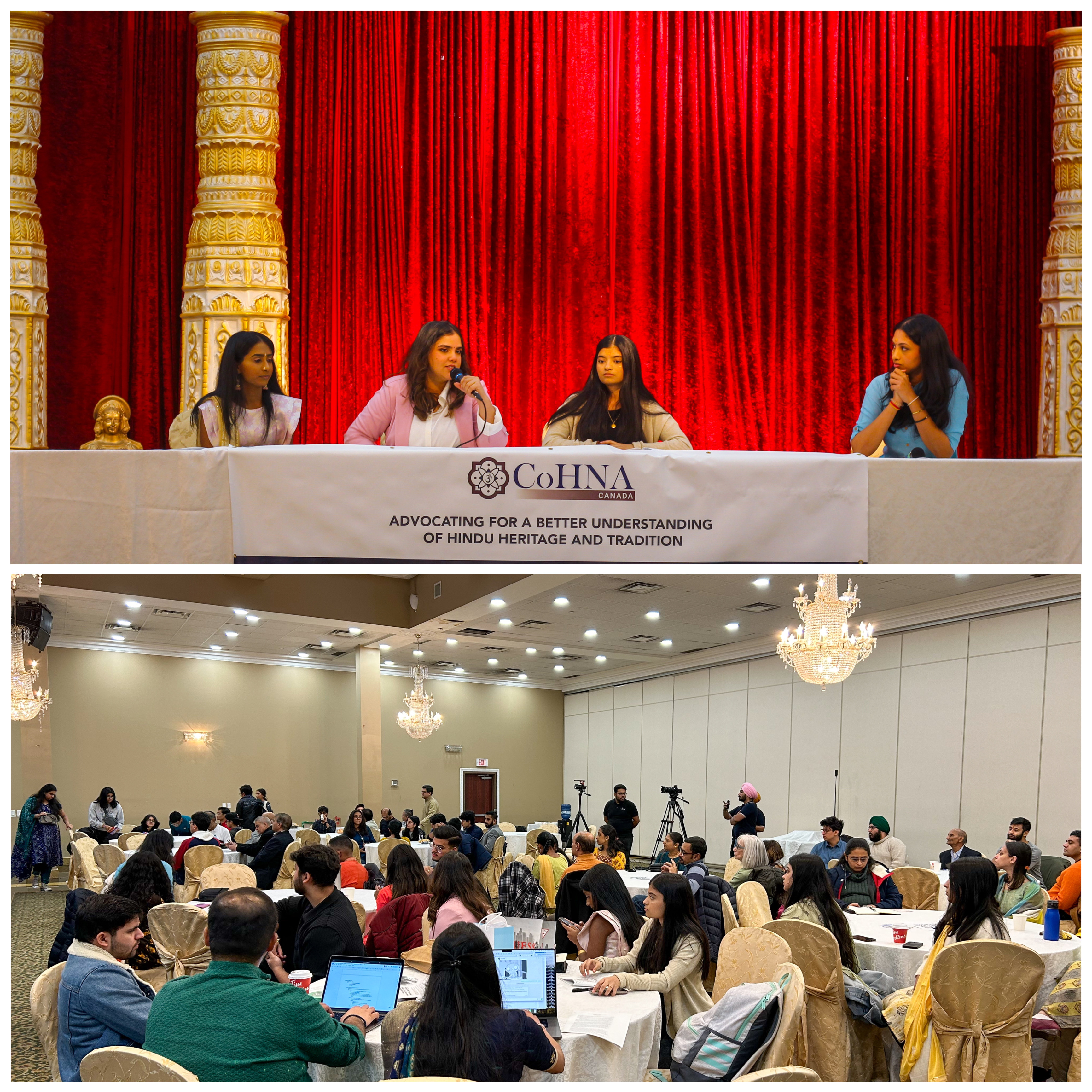DESIBUZZCanada
Events Listings
Dummy Post

International Day Of Yoga To Be Virtually Celebrated Saturday At 4pm

CANCELLED: Coronavirus Fears Kills Surrey’s Vaisakhi Day Parade

ADVERTISE WITH US: DESIBUZZCanada Is The Most Read South Asian Publication Online

SURREY LIBRARIES: Get Technology Help At Surrey Libraries

WALLY OPPAL: Surrey Police Transition Update On Feb. 26

GONE ARE THE DAYS - Feature Documentary Trailer

Technology Help At Surrey Libraries

Birding Walks

Plea Poetry/short Story : Youth Contest

International Folk Dancing Drop-in Sessions
Students Share Their Challenges of Being Hindu on Canadian Campuses At Youth Event
- January 16, 2024

EDITOR’S NOTE: This article from the Coalition of Hindus of North America (Canada) on their conference didn’t point to specifics where Hindus are subjected to Hinduphobia and it is a stretch to compare Hinduphobia to anti-Semitism as Islamophobia is more closer to anti-Semitism most would agree. And the group didn’t do a good job in addressing Hindutava and the oppression of minorities in India although many of the Hindu students quoted in the article seem to be from the Caribbean which may present different challenges as those Hindu communities grew up in a colonial and oppressive environment. But clearly in India, where Hindus are a majority – Hindutava forces have been oppressing not only minorities like Sikhs, Muslims, Christians, Budhists etc., but also lower caste Hindus with deadly consequences and this has been borne out by overwhelming evidence and statistics of atrocities committed by the majority community. The conference in the future will do well to address this aspect of Hindutava oppression if it want to be taken seriously of Hinduphobia in the West and colonial lands.
TORONTO - The Coalition of Hindus of North America (Canada) and Hindu Students Council successfully convened a transformative event titled “Hindu Youth Advocacy,” which featured a series of enlightening sessions and discussions by Hindu Canadian youth leaders on the multifaceted challenges hindering Hindu identity expression and advocacy in academic and social spheres.
A packed room saw high school and university students and several community leaders flag the issues impacting Hindu Canadian youth and how these youth leaders are working to resolve them on campuses.
A panel moderated by social media influencer and youth leader Shefali Panickar, featuring OCAD University HSC President Khushi Jetley, Queen’s University HSC Founder Adeeti Asnora, and University of Toronto HSC Outreach Liaison Kashmeena Mangal delved into personal experiences and the broader implications of Hinduphobia in Canada. Discussions ranged from the challenges of upholding Hindu traditions in academic settings to the misconceptions and stereotypes faced by Hindu students.
Khushi Jetley shared insights on the power of advocacy in changing perception and stressed the importance of owning up to our festivals, symbols, and terminologies. She provided an example of how there was pressure on Hindu students at OCAD to avoid using the term “Rath Yatra” for a sacred religious procession since that term “can be offensive.” Stressing the importance of Hindu students speaking up for themselves, she said, “we need to take control of the narrative, and it only comes with education. Educate yourself so that no outsider can define you.”

Kashmeena Mangal highlighted the intersectional challenges as an Indo-Caribbean Hindu while navigating through the transgenerational trauma of slavery in Guyana. While talking about the allegations of being “political agents of India” that Hindu students, even of Caribbean descent, face when they speak about Hinduphobia and decolonization, she said, “We're not being political; we're just standing up for our civil rights when we talk about Hinduphobia and decolonization.”
Adeeti Asnora discussed her interfaith work and pointed out some commonalities between Hinduphobia and antisemitism. She shared how a mere celebration of Hindu festivals by the students would invite comments like: “how can you celebrate when minorities are being oppressed in India?”.
Talking about how she was targeted in her university for speaking up for issues impacting the Hindu community, she added: “when I started talking about Hindu genocide and Hinduphobia, rumors started in Queens University that my advocacy has to do with furthering ‘Hindutva nationalism’ and establishing ‘Hindu supremacy’ in Canada.”
The panelists urged young school and university students to become aware of the community issues, join or start HSC chapters in their schools/universities, and be proud of their Hindu identity.
Shawn Binda, a Canadian YouTuber of Indo-Canadian descent talked about what it meant to be a temple-going Hindu of Indo-Caribbean descent in Canada from the 80s to now - the history of the Caribbean Hindu community in Canada, its challenges in the Caribbean and Canada and how the community kept the traditions alive. Emphasizing art as an agent of change and cultural preservation, he said: “how do you keep a culture alive? You keep the arts alive.”

Reflecting on how Caribbean Hindus preserved their Hindu identity, he said, “Persistence of Hindu identity is not just lip service. It requires work to change ourselves (to influence people around you), and work in the local community.”
Sohini Sircar, Chairwoman of Hindu Studens Council, elaborated on the academic definition of Hinduphobia, along with the misinformation and disinformation that exists about Hindus and Hindu culture. She emphasized the disproportionate space provided to teaching European history in World History class curricula as compared to Eastern histories and within that, Hindu history. And, when talking about Hindu history, the discriminatory “caste” system is falsely projected as one of the main pillars of Hindu dharma. Elaborating on the work done by the HSC to combat Hinduphobia and disinformation, she said, “we need to promote a deeper understanding of Hindu Dharma in the media, schools and universities.”
CoHNA Canada President Rishabh Sarswat urged the audience to contemplate on “transgenerational trauma.” Highlighting that in the context of the Hindu community’s history, he said, “some historians say that the history of Hindu persecution is one of the bloodiest in the world. But the silencing of Hindu trauma is done to the extent that nobody in western universities wants to acknowledge that such history exists.”
He commended the Caribbean Hindu community for keeping the traditions alive across generations in a foreign country, and said, “I would consider a success if 150 years from now, the broader Canadian Hindu community is as proud and assertive about their identity in Canada as Caribbean Hindus have been despite resisting proselytization and persecution.”


















